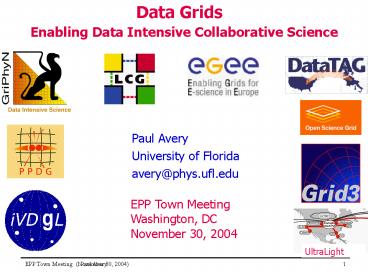Data Grids Enabling Data Intensive Collaborative Science - PowerPoint PPT Presentation
1 / 11
Title:
Data Grids Enabling Data Intensive Collaborative Science
Description:
Drives need for powerful linked resources: 'Data Grids' Computation Massive, distributed CPU. Data storage and access Distributed hi-speed disk and tape ... – PowerPoint PPT presentation
Number of Views:40
Avg rating:3.0/5.0
Title: Data Grids Enabling Data Intensive Collaborative Science
1
- Data GridsEnabling Data Intensive Collaborative
Science
Paul Avery University of Florida avery_at_phys.ufl.ed
u
EPP Town Meeting Washington, DCNovember 30, 2004
2
Data Grids Collaborative Research
- Scientific discovery increasingly dependent on
collaboration - Computationally data intensive analyses
- Resources and collaborations distributed
internationally - Dominant factor data growth (1 Petabyte 1000
TB) - 2000 0.5 Petabyte
- 2005 10 Petabytes
- 2012 100 Petabytes
- 2018 1000 Petabytes?
- Drives need for powerful linked resources Data
Grids - Computation Massive, distributed CPU
- Data storage and access Distributed hi-speed disk
and tape - Data movement International optical networks
- Collaborative research and Data Grids
- Data discovery, resource sharing, distributed
analysis, etc.
How to collect, manage, access and interpret
this quantity of data?
3
Data Intensive Disciplines
- High energy nuclear physics
- Belle/BaBar, Tevatron, RHIC, JLAB
- LHC
- Astronomy
- Digital sky surveys, Virtual Observatories
- VLBI arrays multiple- Gbps data streams
- Gravity wave searches
- LIGO, GEO, VIRGO, TAMA, ACIGA,
- Earth and climate systems
- Earth Observation, climate modeling,
oceanography, - Biology, medicine, imaging
- Genome databases
- Proteomics (protein structure interactions,
drug delivery, ) - High-res brain scans (1-10?m, time dependent)
4
LHC Global Data Grid
- 5000 physicists, 60 countries
- 10s of Petabytes/yr by 2008
- 1000 Petabytes in lt 10 yrs?
CMS Experiment
Online System
CERN Computer Center
0.1 - 1.5 GB/s
Tier 0
10-40 Gb/s
Tier 1
gt10 Gb/s
Tier 2
2.5-10 Gb/s
Tier 3
Tier 4
Physics caches
PCs
5
HEP and Data Grid Projects
HEP led projects
- U.S. Projects
- GriPhyN (NSF)
- iVDGL (NSF)
- Particle Physics Data Grid (DOE)
- Open Science Grid
- UltraLight
- TeraGrid (NSF)
- DOE Science Grid (DOE)
- NEESgrid (NSF)
- NSF Middleware Initiative (NSF)
- EU, Asia projects
- EGEE (EU)
- LCG (CERN)
- DataGrid
- EU national Projects
- DataTAG (EU)
- CrossGrid (EU)
- GridLab (EU)
- Japanese, Korea Projects
- Not exclusively HEP (but most driven/led by HEP)
- Many 10s x M brought into the field
- Large impact on other sciences, education
6
- Grid3 An Operational National Grid
- 30 sites, 3500 CPUs Universities 4 national
labs - Running since October 2003, part of LHC Grid
- Will evolve into Open Science Grid in 2005
- Applications in HEP, LIGO, SDSS, Genomics, CS
http//www.ivdgl.org/grid3 http//www.openscienceg
rid.org/
7
Data Grids and HEPs Broad Impact
- Grids enable 21st century collaborative science
- Linking research communities and resources for
scientific discovery - Driven by LHC global collaborations pursuing
petascale science - Integration of university and laboratory
resources - Direct impacts of HEP leadership in Grid
development - New models tools for collaborative research
- Advanced optical network infrastructure
- Collaborative research with other disciplines
- Many national international initiatives
(research, networks, EO) - Influence on funding agency agendas
- NSF, DOE, EU
8
Extra Slides
9
LCG LHC Computing Grid
- Global Grid infrastructure for LHC experiments
- Matched to decades long research program of LHC
- Large scale resources
- Hundreds of resource sites throughout the world
- Common resources, tools, middleware and
environments - Operated and supported 24x7 globally
- A robust, stable, predictable, supportable
infrastructure
10
(No Transcript)
11
Grids and the Digital DivideRio de Janeiro, Feb.
16-20, 2004
NEWS Bulletin ONE TWOWELCOME BULLETIN
General InformationRegistrationTravel
Information Hotel Registration Participant List
How to Get UERJ/Hotel Computer Accounts Useful
Phone Numbers Program Contact us Secretariat
Chairmen
- Background
- World Summit on Information Society
- HEP Standing Committee on Inter-regional
Connectivity (SCIC) - Themes
- Global collaborations, Grids and addressing the
Digital Divide - Next meeting May 2005 (Korea)
http//www.uerj.br/lishep2004































